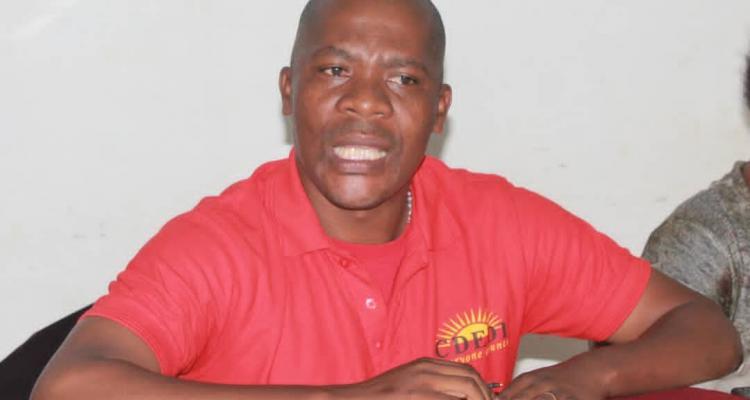
The Centre for Democracy and Economic Development Initiatives (CDEDI) says the ongoing wrangle between the Ministry of Trade and Industry and Illovo Sugar Company over pricing is happening due to lack of proper regulation of the sugar industry in the country, which for decades gifted Illovo Sugar Company with a monopoly of the sugar industry.
CDEDI Executive Director Sylvester Namiwa told the press in Blantyre that all this drama is happening as a Sugar Industry Bill of 2021 is gathering dust at Capital Hill in Lilongwe.
Meanwhile, the industry is being governed by the Control of Goods Act (COGA) of 2018 that replaced the 1950 Act thereby necessitating the Monopoly as the current law does not effectively regulate the growing of sugar cane, sugar production and imports and exports.
“That said, it is important to point out that neither government nor the 4000 local cane growers from Chikwawa, Salima and Nkhotakota are benefiting from the sugar industry’s known obscene profits which hover around 700 percent annually,” he pointed out.
The CDEDI Executive Director has implored authorities to consider that sanity can only prevail in the sugar industry with the passing of the Sugar Industry Bill of 2021.
“Surprisingly, during the current debate, major stakeholders, the cane growers and the consumers have been thrown out for the convenience of government and the sugar manufacturing company,” he said.
He noted that the sad thing is demonstrated when seeing that the focus is on the alleged MK30 billion Illovo pays to government in taxes, a threat on job losses and agonizing over lack of forex for importing sugar.
“No one is talking about the pushing of the inhabitants in Chikwawa to flood-prone areas to give way to more sugar plantations. Nothing is being said about the dehumanizing poverty the cane growers are enduring, which is visible as they cannot afford a kilogram of sugar for porridge after selling their sugar cane, let alone afford the by-products of the sugar cane that they toil to grow,” narrates Namiwa.
He further argued that the sugar industry in Malawi has culminated into modern-day slavery, where the poor are literary sweating with nothing to show for the huge land they lost to the estate owners, the labour and environment-related effects they have been subjected to, following application of pesticides on the sugar plantations.
He said that the current rate of exploitation is worrisome considering that all is happening despite the fact that industrial sugar is an important raw material for the beverage industry that is equally providing both direct and indirect jobs to millions of Malawians and revenue through taxes.
“Just to paint a picture, elsewhere in the world per-capita consumption stands at 28 kilograms per person per year while in Malawi it is at record half; 14 kilograms per person per year. Given the 22 million population projection, Malawi’s annual sugar demand is pegged at 350, 000 tons. Salima Sugar produces around 20,000 while Illovo produces 250,000 tons. Out of this, 100,000 tons is exported, leaving Malawi with a deficit of 180, 000 tons. But this deficit is not felt on the local market since to millions of vulnerable Malawians, sugar is a luxury,” he elaborated.
Another irritating fact is about transfer pricing allegations where Illovo reportedly exports sugar to sister companies in Zambia and Mozambique at USD500 per ton, while in these countries, the same commodity is sold at USD850 per ton, thereby denying Malawi about USD350 of forex per ton in the process which translates into a loss of USD35 million.
“In return, Zambia exports the Malawi sugar to its European Union market, owing to the fact that our soils produce highest quality cane with a 13.5 percent sucrose extraction rate as compared to our neighbours, who are at 8.5 percent. This begs the questions: Are proceeds from these transactions declared, or do they trickle back to Malawi ? Malawians have a right to know that Illovo is at liberty to import sugar as and when it pleases them! Apparently, they bank on their dominance in the region to bully government,” he said.
Namiwa feels that the duel in export licenses and price injustices validates CDEDI’s demand that the Parliamentary Committee on Trade and Industry should, on behalf of Malawians, conduct a public inquiry on sugar production and pricing.
“Therefore, all eyes are on the current Chairperson of the committee, Hon Paul Nkhoma MP, to do the needful. It is for the above reasons that CDEDI hereby informs Malawians that while pushing for the immediate sugar price cut, it intends to lobby individual Members of Parliament and relevant parliamentary committees to ensure that the Sugar Industry Bill is prioritised and transacted during the next sitting of Parliament,” he said.
Illovo Sugar Company recently rubbished Government press release that was informing Malawians that Illovo Sugar Company has agreed to reduce sugar prices.
However, CDEDI still reiterates its stand that it will not rest until sugar prices come down.
“If sugar is an affordable basic commodity in neighbouring countries, why should it be beyond the reach of the majority of Malawians who equally deserve a decent living? Let’s join hands to pull down the price of sugar,” said Namiwa
At the presser, Namiwa was flanked by concerned citizens who shared the same view that prices of sugar (both domestic and industrial) ought to be reduced.
Follow us on Twitter:














